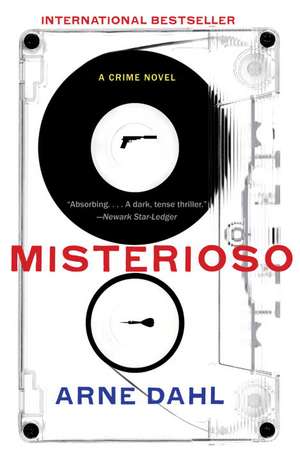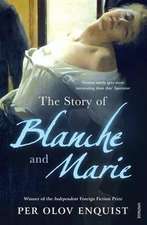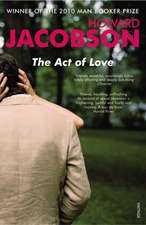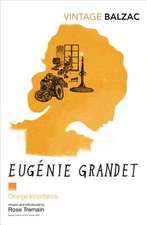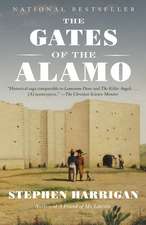Misterioso
Autor Arne Dahl Traducere de Tiina Nunnallyen Limba Engleză Paperback – 30 iun 2012
After dismantling a bloody hostage situation at a bank outside Stockholm, Detective Paul Hjelm is dropped into an elite task-force assembled to find an elusive murderer with a sophisticated method. The killer breaks into the homes of Sweden’s high-profile business leaders at night, places two bullets in their heads with deadly precision, then removes the bullets from the walls—a ritual enacted to a rare bootleg recording of Thelonious Monk’s jazz classic “Misterioso.” As Hjlem and the rest of the team follow one lead after another, they must navigate the murky underworld of the Russian mafia, penetrate the secret society of Sweden’s wealthiest denizens, and battle one of the country’s most persistent ills: a deep-rooted xenophobia that affects both the police and the perpetrator.
Preț: 103.27 lei
Nou
Puncte Express: 155
Preț estimativ în valută:
19.77€ • 21.34$ • 16.57£
19.77€ • 21.34$ • 16.57£
Carte tipărită la comandă
Livrare economică 19 aprilie-03 mai
Preluare comenzi: 021 569.72.76
Specificații
ISBN-13: 9780307388032
ISBN-10: 0307388034
Pagini: 339
Dimensiuni: 134 x 205 x 21 mm
Greutate: 0.27 kg
Editura: VINTAGE BOOKS
ISBN-10: 0307388034
Pagini: 339
Dimensiuni: 134 x 205 x 21 mm
Greutate: 0.27 kg
Editura: VINTAGE BOOKS
Notă biografică
Arne Dahl is an award-winning crime novelist and literary critic. He lives in Sweden.
Extras
1
Something was forcing its way through the winter.
He couldn’t put his finger on it, but there was something. Maybe a warming breeze, a flicker of light smack in the middle of the mass of gray clouds, or possibly just the fact that he heard a splash rather than a crunch when he stepped in the puddle that all winter long had encircled his personal parking space—the one that still bore his name.
He paused for a moment and squinted up at the morning cloud cover. It looked the same as usual, hovering there like a virtual ceiling of security above the bank, bidding him welcome.
The same silence as always.
A short distance away was the little town, undisturbed, sending up only one sign of life: fine tendrils of smoke from chimneys. He heard the repetitive cheeping of the marsh tit and saw it peek from its nest just under the eaves. Then he locked the car and strode the few yards to the small, modest door of the employees’ entrance. He took out his even more modest key ring and one by one opened the three deadbolts.
Inside the bank office it smelled like an ordinary Monday, a bit stuffy from the weekend, but Lisbet would soon air it out when she arrived second, as usual, bringing her flood of cheerful chatter.
He himself was always the first to arrive; that was the routine.
Everything was exactly the same as always.
That was what he told himself several times: Everything is exactly the same as always.
He may have said it once too often.
He stood at his teller’s window and pulled out the drawer. He took out an oblong gilded case and cautiously weighed one of the long, bristled darts in his hand. His special weapon.
Not many people, even among the initiated, really knew how a dart was supposed to look. His darts were long—specially designed to four and three-quarters inches, almost two and three quarters of which were a long point that always surprised his opponents, and very short, bristly flights.
He picked up the three darts and slipped around the dividing wall into the office interior. There was the board. Without looking down, he took up position with the tips of his toes on the little black throw line exactly seven feet nine and one-quarter inches from the dartboard and rhythmically flung the three darts. All three stuck in the large bed of the 1. He was just warming up.
Everything landed where it should.
Everything was as it should be.
He clasped his hands and stretched them outward until they made a light cracking sound, then let his fi ngers flutter freely in the air for several seconds. Again he took the key ring out of his jacket pocket, swung back around the dividing wall to the public area of the bank, went over to the vault, and unlocked it. The vault door opened slowly, ponderously, with a muted groan.
It sounded the way it always did.
He carried a box containing thick bundles of banknotes to his teller’s station and spread them out over the work surface. He studied them for a moment, just as he always did.
Soon Lisbet would come drifting in through the employees’ entrance and start babbling on about her family; then Albert would arrive, clearing his throat in a slightly superior way and nodding stiffly; and last would be Mia, dark, silent, and reserved, peering out from under her bangs. Soon the smell of Lisbet’s coffee would waft away any remaining stuffiness and fi ll the office with an air of quiet humanity.
Then the scattered knots of customers would appear: the farmers fumbling with ancient bankbooks, housewives meticulously recording their meager withdrawals, pensioners struggling to avoid resorting to cat food.
This was where he had been happy for so long. But the town was getting smaller and smaller, the customers fewer and fewer.
Everything is exactly the same as always, he thought.
He went back around the dividing wall to play a quick round of 501. From 501 down to zero. A couple of triple-20s and some single bulls sped up the countdown. Exactly as always. The darts landed where they were supposed to. The slightly unusual wavering flight, which was the trademark of his darts, made them hit the mark every time. He had 87 points to go when the alarm clock rang.
Nine-thirty.
Still engrossed in the strategy for the last round, he went over to the front door and unlocked it.
Everything was exactly the same as always.
Let’s make it simple, he thought, a simple 15 and a simple 20 and then the one double bull of the morning for 50 points, as the perfect combination: 85. Then only the checkout left, the double ring of the 1. Eighty-seven. No problem. The hard part was putting the third dart in the little black center of the bull’s-eye. A good start to the day.
A good start to a completely ordinary day.
He hit 15 in the outer bed and 20 in the inner, just to make things interesting. The dart teetered at the wire next to the irksome 1, but it held. The wire trembled a bit from the contact. Then the bull’s-eye was left, right in the center. He focused his attention, raised the dart, lined up the ring with the long point, and drew the dart back four inches, exactly at eye level.
The door slammed.
That couldn’t be. It wasn’t right. It was too early. Damn.
He lowered the dart and walked out to the bank office.
An enormous, ox-like man was pointing a big, long pistol at him.
He stood there petrified. Everything fell apart. This was wrong, this was so wrong. Not now. Not now, please. The floor seemed to fall away from under him.
The man came up to the teller’s window and held out an empty suitcase.
He put down the dart, opened the hatch; stunned, he took the bag.
“Fill it up,” the ox-like man said in heavily accented English.
Quietly and methodically he placed one bundle of banknotes after another into the suitcase. Next to the bag lay the dart with the long point. Thoughts were surging through his mind, helter skelter. Only the bull’s-eye left, he thought. He thought about Lisbet and about nine-thirty, and about a bank door he had unlocked out of old habit. He thought about checking out in the double ring.
The ox-like man lowered the pistol for a moment and looked around nervously.
He thought about his ability to perform his best under extreme pressure.
“Hurry up!” snarled the ox, casting nervous glances out the window. His eyes were very black inside reddish rings.
Bull’s-eye, he thought and grabbed the dart.
Then all that remained was the checkout.
From the Hardcover edition.
Something was forcing its way through the winter.
He couldn’t put his finger on it, but there was something. Maybe a warming breeze, a flicker of light smack in the middle of the mass of gray clouds, or possibly just the fact that he heard a splash rather than a crunch when he stepped in the puddle that all winter long had encircled his personal parking space—the one that still bore his name.
He paused for a moment and squinted up at the morning cloud cover. It looked the same as usual, hovering there like a virtual ceiling of security above the bank, bidding him welcome.
The same silence as always.
A short distance away was the little town, undisturbed, sending up only one sign of life: fine tendrils of smoke from chimneys. He heard the repetitive cheeping of the marsh tit and saw it peek from its nest just under the eaves. Then he locked the car and strode the few yards to the small, modest door of the employees’ entrance. He took out his even more modest key ring and one by one opened the three deadbolts.
Inside the bank office it smelled like an ordinary Monday, a bit stuffy from the weekend, but Lisbet would soon air it out when she arrived second, as usual, bringing her flood of cheerful chatter.
He himself was always the first to arrive; that was the routine.
Everything was exactly the same as always.
That was what he told himself several times: Everything is exactly the same as always.
He may have said it once too often.
He stood at his teller’s window and pulled out the drawer. He took out an oblong gilded case and cautiously weighed one of the long, bristled darts in his hand. His special weapon.
Not many people, even among the initiated, really knew how a dart was supposed to look. His darts were long—specially designed to four and three-quarters inches, almost two and three quarters of which were a long point that always surprised his opponents, and very short, bristly flights.
He picked up the three darts and slipped around the dividing wall into the office interior. There was the board. Without looking down, he took up position with the tips of his toes on the little black throw line exactly seven feet nine and one-quarter inches from the dartboard and rhythmically flung the three darts. All three stuck in the large bed of the 1. He was just warming up.
Everything landed where it should.
Everything was as it should be.
He clasped his hands and stretched them outward until they made a light cracking sound, then let his fi ngers flutter freely in the air for several seconds. Again he took the key ring out of his jacket pocket, swung back around the dividing wall to the public area of the bank, went over to the vault, and unlocked it. The vault door opened slowly, ponderously, with a muted groan.
It sounded the way it always did.
He carried a box containing thick bundles of banknotes to his teller’s station and spread them out over the work surface. He studied them for a moment, just as he always did.
Soon Lisbet would come drifting in through the employees’ entrance and start babbling on about her family; then Albert would arrive, clearing his throat in a slightly superior way and nodding stiffly; and last would be Mia, dark, silent, and reserved, peering out from under her bangs. Soon the smell of Lisbet’s coffee would waft away any remaining stuffiness and fi ll the office with an air of quiet humanity.
Then the scattered knots of customers would appear: the farmers fumbling with ancient bankbooks, housewives meticulously recording their meager withdrawals, pensioners struggling to avoid resorting to cat food.
This was where he had been happy for so long. But the town was getting smaller and smaller, the customers fewer and fewer.
Everything is exactly the same as always, he thought.
He went back around the dividing wall to play a quick round of 501. From 501 down to zero. A couple of triple-20s and some single bulls sped up the countdown. Exactly as always. The darts landed where they were supposed to. The slightly unusual wavering flight, which was the trademark of his darts, made them hit the mark every time. He had 87 points to go when the alarm clock rang.
Nine-thirty.
Still engrossed in the strategy for the last round, he went over to the front door and unlocked it.
Everything was exactly the same as always.
Let’s make it simple, he thought, a simple 15 and a simple 20 and then the one double bull of the morning for 50 points, as the perfect combination: 85. Then only the checkout left, the double ring of the 1. Eighty-seven. No problem. The hard part was putting the third dart in the little black center of the bull’s-eye. A good start to the day.
A good start to a completely ordinary day.
He hit 15 in the outer bed and 20 in the inner, just to make things interesting. The dart teetered at the wire next to the irksome 1, but it held. The wire trembled a bit from the contact. Then the bull’s-eye was left, right in the center. He focused his attention, raised the dart, lined up the ring with the long point, and drew the dart back four inches, exactly at eye level.
The door slammed.
That couldn’t be. It wasn’t right. It was too early. Damn.
He lowered the dart and walked out to the bank office.
An enormous, ox-like man was pointing a big, long pistol at him.
He stood there petrified. Everything fell apart. This was wrong, this was so wrong. Not now. Not now, please. The floor seemed to fall away from under him.
The man came up to the teller’s window and held out an empty suitcase.
He put down the dart, opened the hatch; stunned, he took the bag.
“Fill it up,” the ox-like man said in heavily accented English.
Quietly and methodically he placed one bundle of banknotes after another into the suitcase. Next to the bag lay the dart with the long point. Thoughts were surging through his mind, helter skelter. Only the bull’s-eye left, he thought. He thought about Lisbet and about nine-thirty, and about a bank door he had unlocked out of old habit. He thought about checking out in the double ring.
The ox-like man lowered the pistol for a moment and looked around nervously.
He thought about his ability to perform his best under extreme pressure.
“Hurry up!” snarled the ox, casting nervous glances out the window. His eyes were very black inside reddish rings.
Bull’s-eye, he thought and grabbed the dart.
Then all that remained was the checkout.
From the Hardcover edition.
Recenzii
“Absorbing. . . . A dark, tense thriller.”
—Newark Star-Ledger
“Terrific. . . . Full of twists and turns, blind alleys and sudden assaults, procedural hassles and stakeouts. ”
—Providence Journal
“Thoughtfully haunting and sometimes beautifully written, the first of Hjelm’s cases to be translated into English is likely to resonate with readers of the Stieg Larsson trilogy.”
—Austin American-Statesman
“Mystery devotees who loved Mankell’s Kurt Wallander, and crime-fiction ‘lifers’ who still treasure Sjowall’s and Wahloo’s Martin Beck, will want to add Paul Hjelm to their short lists of international favorites.”
—Booklist
“A truly fine crime novel.”
—The Advocate (Baton Rouge)
“[A] superb police procedural. . . . Dahl has created a brilliant character and a terrific story, and should that not be enough, this is a classic cop-shop tale of the old school.”
—The Globe and Mail (Toronto)
“Most of the fun of Misterioso comes from the follow-the-power, follow-the-money games played by Hjelm and his associates. And while Dahl clearly sees detective fiction as having the ability to tackle hard-hitting issues of the day, the mystery’s solution isn’t lacking in good old-fashioned puzzle intrigue, either.”
—The Portland Mercury
“A unique and wonderful book. It is part mystery, part police procedural, part existential philosophy, and part comedy. There is something so distinctive about this book that it resists categorization. . . . There is not a dull moment. It seems like the Scandinavians are having a true renaissance in crime writing and Arne Dahl is right at the top.”
—MostlyFiction.com
“An exciting debut. . . . Fans of hard-boiled detective and Swedish novels will enjoy this.”
—Library Journal
—Newark Star-Ledger
“Terrific. . . . Full of twists and turns, blind alleys and sudden assaults, procedural hassles and stakeouts. ”
—Providence Journal
“Thoughtfully haunting and sometimes beautifully written, the first of Hjelm’s cases to be translated into English is likely to resonate with readers of the Stieg Larsson trilogy.”
—Austin American-Statesman
“Mystery devotees who loved Mankell’s Kurt Wallander, and crime-fiction ‘lifers’ who still treasure Sjowall’s and Wahloo’s Martin Beck, will want to add Paul Hjelm to their short lists of international favorites.”
—Booklist
“A truly fine crime novel.”
—The Advocate (Baton Rouge)
“[A] superb police procedural. . . . Dahl has created a brilliant character and a terrific story, and should that not be enough, this is a classic cop-shop tale of the old school.”
—The Globe and Mail (Toronto)
“Most of the fun of Misterioso comes from the follow-the-power, follow-the-money games played by Hjelm and his associates. And while Dahl clearly sees detective fiction as having the ability to tackle hard-hitting issues of the day, the mystery’s solution isn’t lacking in good old-fashioned puzzle intrigue, either.”
—The Portland Mercury
“A unique and wonderful book. It is part mystery, part police procedural, part existential philosophy, and part comedy. There is something so distinctive about this book that it resists categorization. . . . There is not a dull moment. It seems like the Scandinavians are having a true renaissance in crime writing and Arne Dahl is right at the top.”
—MostlyFiction.com
“An exciting debut. . . . Fans of hard-boiled detective and Swedish novels will enjoy this.”
—Library Journal
